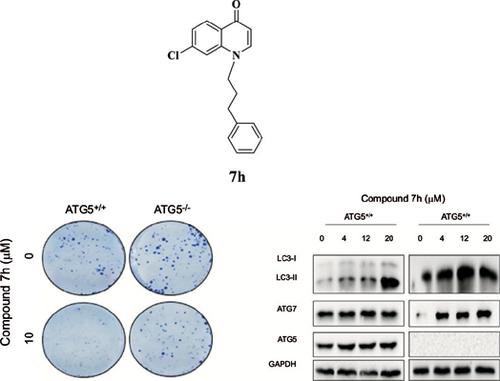Letters in Drug Design & Discovery ( IF 1.2 ) Pub Date : 2020-05-31 , DOI: 10.2174/1570180816666191122113045 Yifan Jia 1 , Difei Yu 2 , Qiuhua Huang 3 , Xiaodong Zhang 2 , Liqin Qiu 3 , Rihui Cao 3 , Runlei Du 2 , Wenbin Liu 4

|
Background: Quinolines have been characterized as a class of potential antitumor agents, and a large number of natural and synthetic quinolines acting as antitumor agents were reported.
Methods: A series of 7-chloro-4(1H)-quinolone derivatives were synthesized. The antiproliferative effect of these compounds was evaluated by MTT assay against five human tumor cell lines. The mechanism of action of the selected compound 7h was also investigated.
Results and Discussion: Most of the compounds had more potent antiproliferative activities than the lead compound 7-chloro-4(1H)-quinolone 6b. Compound 7h was found to be the most potent antiproliferative agent against human tumor cell lines. Further investigation demonstrated that compound 7h triggered ATG5-dependent autophagy of colorectal cancer cells by promoting the functions of LC3 proteins.
Conclusion: These results were useful for designing and discovering more potent novel antitumor agents endowed with better pharmacological profiles.
中文翻译:

靶向ATG5蛋白的自噬诱导剂4(1H)-喹诺酮衍生物的设计与合成
背景:喹啉已被表征为一类潜在的抗肿瘤药,并且已报道了大量天然和合成的喹啉作为抗肿瘤药。
方法:合成了一系列7-氯-4(1H)-喹诺酮衍生物。通过MTT分析评估了这些化合物对五种人类肿瘤细胞系的抗增殖作用。还研究了所选化合物7h的作用机理。
结果与讨论:大多数化合物具有比先导化合物7-chloro-4(1H)-喹诺酮6b更强的抗增殖活性。发现化合物7h是针对人肿瘤细胞系的最有效的抗增殖剂。进一步的研究表明,化合物7h通过促进LC3蛋白的功能触发了大肠癌细胞的ATG5依赖性自噬。
结论:这些结果对于设计和发现具有更好药理学特征的更有效的新型抗肿瘤药物是有用的。































 京公网安备 11010802027423号
京公网安备 11010802027423号